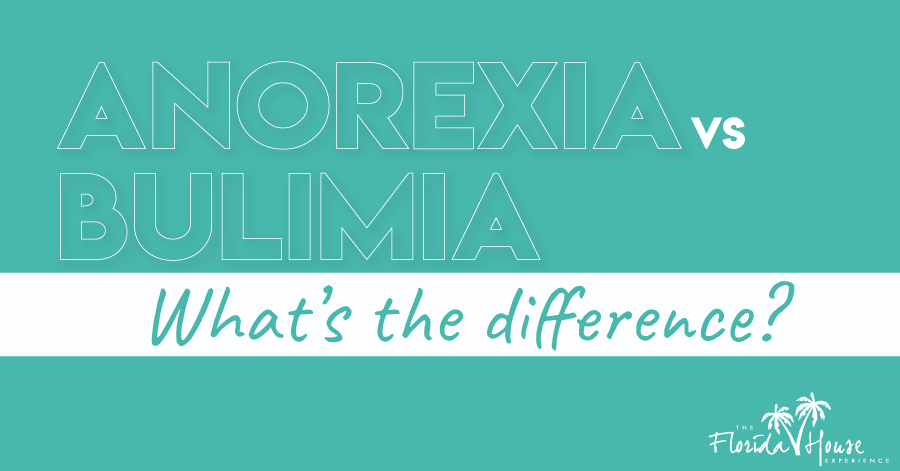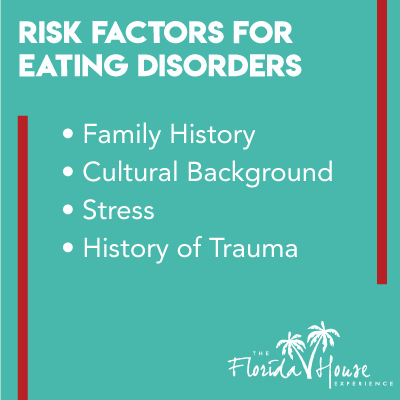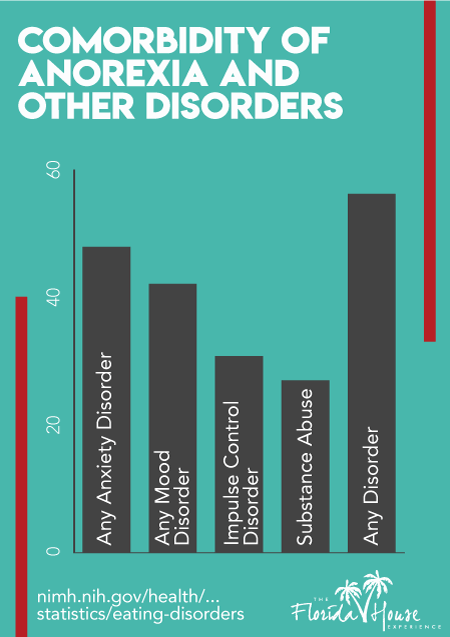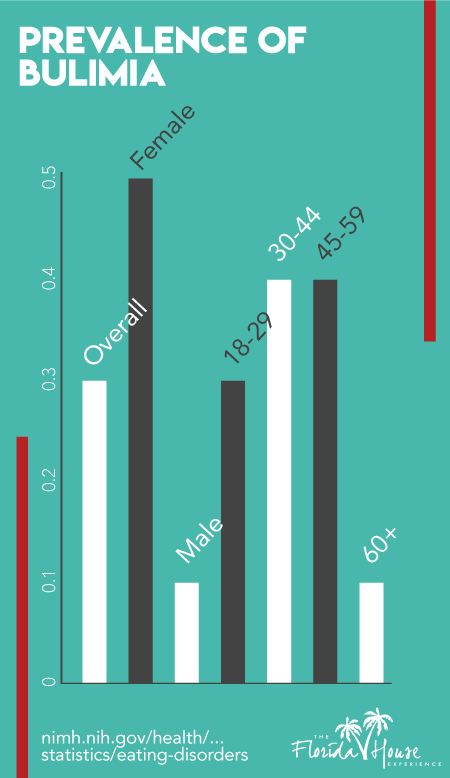
Anorexia and bulimia are the most common eating disorders, afflicting millions of people across the world.
It is common knowledge that people with anorexia tend to eat less, introducing restrictive diets in their lives. On the other hand, people with bulimia eat a lot, using various methods to purge. However, the truth is much more complex, and people may be suffering from both disorders at once.
Both anorexia and bulimia are dangerous and can ruin a person’s life, but what are the differences, exactly? In this article, we are taking an in-depth look at Anorexia vs Bulimia.
Understanding Eating Disorders
Anorexia nervosa and bulimia nervosa are the two most common clinically recognized eating disorders. According to experts, as many as 70 million people suffer from an eating disorder, and 30 million of these people are in the US alone.
To put the numbers into perspective, one out of ten Americans is suffering from some form of an eating disorder. Globally, this figure is one out of a hundred people.
The figures may be even higher since many sufferers are reluctant to come forward for proper diagnosis. Denial, guilt, embarrassment, and confusion may lead people suffering from eating disorders to remain hidden. This is dangerous as eating disorders can lead to serious health problems, and even death, if left untreated.

What Causes Anorexia and Bulimia?
The exact causes behind eating disorders are still unclear. However, both anorexia and bulimia have certain common risk factors.
Background from family members plays an important role in eating disorders. Many people suffering from anorexia or bulimia had parents who were also sufferers. Another common risk factor is a parent who is obsessed with beauty, “ideal” weight, and a perfect image. These obsessions can stress children enough to develop anorexia or bulimia.
Another risk factor is the cultural background of a person. People in countries like the US are more likely to suffer from eating disorders. That is because the media advertise weight loss and celebrities promote an image of “perfection”. In fact, three out of seven people suffering from eating disorders in the world reside in the US!
Stress and trauma, especially from bullying can bring about anorexia. Obese children who are bullied about their weight may develop eating disorders as they reach their teen years.
People suffering from anorexia or bulimia are often in denial or actively try to hide their health problem. If this goes too far, they can even turn into active supporters of anorexic or bulimic behavior.
The so-called “pro-ana” forums promote an anorexic lifestyle that is dangerous to anyone’s physical health. In these communities, people suffering from eating disorders share “thinspiration” images that promote eating almost nothing and being as underweight as you can be. Needless to say, any mention of “pro-ana” or “thinspiration” by a friend is a telltale sign they are suffering from an eating disorder.
How Are Eating Disorders Diagnosed?
 People suffering from an eating disorder often feel sad and inadequate. They may see themselves as unworthy and often ugly. They often feel lonely and depressed.
People suffering from an eating disorder often feel sad and inadequate. They may see themselves as unworthy and often ugly. They often feel lonely and depressed.
Sufferers are almost always obsessed with the way they look, or more accurately, the way they think others look at them. They are also largely unable to control their eating habits.
Doctors and mental health professionals diagnose eating disorders based on a number of symptoms and eating habits. If a doctor suspects you or a loved one has an eating disorder, they will perform certain examinations and tests. These tests include a physical examination, psychological tests, and a self-assessment questionnaire.
Eating disorders may manifest together with other issues, such as anxiety and depression.
What Are Common Symptoms of Anorexia and Bulimia?
Every person exhibits some of the signs associated with eating disorders every once in a while. However, people suffering from anorexia or bulimia experience these problems with extreme intensity. The most common signs and symptoms of eating disorders are:
- Obsession with dieting even when underweight
- Obsession with calories and fat
- Extreme insecurity about physical appearance
- Unrealistic perception of body image (thinking they are too fat even when they are underweight)
- Extreme weight gain or weight loss
- Excessive exercise
- Frequent bathroom visits
- Lack of energy
- Social withdrawal
- Ritualistic behavior, especially in relation to food
- Low self-esteem
- Substance abuse
If you or a loved one exhibits multiple of the above signs, you should look into finding treatment as soon as possible. The symptoms of eating disorders show a serious condition that requires attention from professionals. No person can live with an eating disorder and grow old. To put things into perspective, eating disorders like anorexia and bulimia are deadlier than morbid obesity!
What is Anorexia Nervosa?
Anorexia Nervosa is the most widely known eating disorder and mental illness with the highest mortality rate. The main characteristic of anorexia is dramatic weight loss or lack of expected weight gain in growing children.
Anorexia sufferers generally limit the amount of food they eat in an attempt to get thinner. They may demonize calories and fats as something to be avoided at all costs, or work out compulsively for hours at an end.
Some people with anorexia will also purge what they have eaten via vomiting or laxative use. This is a common symptom of bulimia as well.

Everyone can suffer from anorexia regardless of age, gender, and ethnicity. However, anorexia is more prevalent in early teenagers and it is much more common in girls rather than boys. Historical evidence hints that people have been suffering from anorexia since antiquity.
In recent years, childhood anorexia has become more prevalent and is on the rise. It is impossible to diagnose a child with anorexia just by looking at the child. The same holds true for adults who might even be overweight yet struggle with the early signs of anorexia.
All anorexia sufferers exhibit some kind of obsession with food and body image. The fear of gaining weight and an overall depression are also present in almost all patients.
Left untreated, anorexia will make a person extremely underweight and fatigued. Anorexia will lead to dysfunctional organs and a failing metabolism. It is important for people who suffer from anorexia to undergo mental health rehab as soon as possible.
What is Bulimia Nervosa?
Bulimia Nervosa is as dangerous as anorexia and is often harder to diagnose. The disorder is characterized by a cycle of binging on food and then compensating by self-induced vomiting or use of laxatives.
People suffering from bulimia are unable to resist the urge to eat impossible amounts of food. They then feel the urge to remove food from their bodies as quickly as possible. The vicious circle of compulsory eating and guilt-driven purging is what makes bulimia so dangerous.
Doctors and mental health experts diagnose bulimia by a combination of physical exams and psychological evaluations.
Recurrences of binge eating are a telltale sign of bulimia. If a person eats a lot more than most people would eat under similar circumstances, then they might have bulimia. If the person seems unable to control their eating during that episode, then they are almost certainly suffering from bulimia.

People with bulimia will have elaborate rituals relating to food and will confess to “love” certain foods so much they are unable to stop eating them. This is not a joke and if a friend tells you something like that, you should always take it literally.
Too much eating alone is not enough to hint at bulimia. However, if the person takes unusual actions after eating in order to avoid gaining weight, you should be alarmed. For example, self-induced vomiting, laxative abuse, fasting, or extreme physical activity, are all telltale signs of compensatory behaviors.
Bulimia can be very difficult to diagnose because sufferers often go to great lengths to mask their compensatory behaviors. Moreover, a person suffering from bulimia might not be underweight. They can even appear to be having perfectly normal social lives, even though they might visit the bathroom more often than average to purge in secret.
The dangers of bulimia are both physical and psychological. The ongoing binge-purge circle of bulimia can damage the digestive system and leads to dangerous deficiencies. In extreme cases, bulimia can lead to heart failure even when the patient appears perfectly healthy.
Depending on the type of compensatory behavior, different parts of the body will be affected more. For example, bulimia sufferers who purge with self-induced vomiting will have health problems with their esophagus and their teeth. People who rely on laxatives might suffer from colon problems, rectal prolapse, and incontinence.
However, the most dangerous health problem of bulimia is an electrolyte imbalance. This problem is caused by vomiting as well as laxatives. Electrolyte imbalance can lead to sudden cardiac arrest even in patients that appear completely healthy. This silent killer is what makes bulimia so dangerous to leave untreated.
The Curious Case of Diabulimia
Here we should examine a special case of bulimia known as diabulimia. Diabulimia is an eating disorder afflicting a person with diabetes who intentionally restricts their insulin in order to lose weight.
Diabetes is a dangerous chronic medical condition by itself. It affects a person’s metabolic system and makes it impossible to live a healthy life unless the patient takes regular doses of insulin. Insulin is a hormone that helps regulate blood sugar levels in the body.
By restricting insulin, diabulimic people can indeed lose weight. This comes at the risk of all the health issues brought about by untreated diabetes. Insulin omission can lead to numerous health problems, including:
- Infections
- Muscular atrophy
- Dehydration
- Ketoacidosis
- Macular edema
- Retinopathy
- Blindness
- Neuropathy
- Chronic diarrhea
- Kidney failure
- Liver failure
- Heart failure
- Stroke
- Coma
- Death
With the above risks, as well as all the risks of regular bulimia, diabulimia is perhaps the most dangerous eating disorder there is. Without insulin, people suffering from diabetes are in direct risk of dying.
How Do You Treat Anorexia and Bulimia?
Both anorexia and bulimia are treatable, but the treatment is not always straightforward. You cannot hope to help a person with an eating disorder just by reminding them to eat. It just won’t work.
What you need is a multidisciplinary team of experts to address all the facets of these difficult disorders. The best approach to treating eating disorders is treatment at an inpatient health center that specializes in behavioral health disorders.
In a health center that specializes in eating disorders, people suffering from anorexia or bulimia will be able to deal not only with the disorder itself but also the underlying conditions that triggered the harmful behavior in the first place.
The earlier a sufferer receives help, the easier their treatment is going to be. People who have only recently started skipping meals or binge-purging may be able to reverse all the damage with the help of qualified professionals. The longer the disorder stays untreated, the more long-term damage will accumulate.
If you or someone you know suffers from bulimia or anorexia, do not hesitate to seek professional help straight away. These disorders may seem impossible to overcome, but they are completely treatable. If you ignore the problem, it is only going to get worse as time passes, so act now!
Anorexia vs Bulimia: Finding The Best Behavioral Health Treatment for You or Your Loved One
Now that you know the difference between Anorexia vs Bulimia, you understand how important it is to treat these disorders as efficiently as possible. At the FHE Health (FHE), we understand the challenges of treating behavioral health disorders.
We specialize in a range of addictive and harmful disorders, including depression, anxiety, trauma, and eating disorders. Our team of highly qualified experts shares the desire to help people struggling with behavioral health disorders.
We aim to help people find the balance and happiness they deserve. We do so by innovative, specialized eating disorder treatment in a positive and relaxing environment that promotes healing and wellness.






